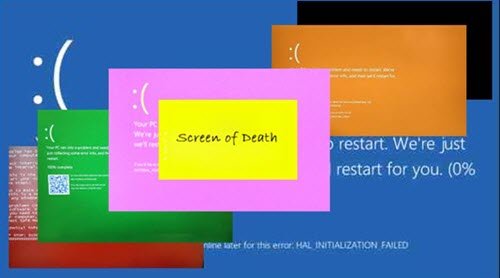Most of us are familiar with the Blue Screen of Death and the Black Screen in Windows OS. But did you know that there are Purple, Brown, Yellow, Red, Orange, and Green Screen of Deaths that software or your system may throw up? There is no simple explanation for why these stop errors occur, as several factors can be involved. However, it is known that the malfunctioning of hardware drivers or drivers that are installed by third-party software drives this unwanted change. Color-coding the error screen helps support staff assign the degree of urgency to several types of Stop screens and prioritize customers.

In most cases, these messages are dubbed as fatal as they typically result in unsaved work being lost and a message advising the user to restart the computer. These are some of the infamous screens of death known to date.
Purple Screen of Death (PSOD)
It is a diagnostic screen with a white type on a purple background. Purple Screen is mainly seen when the VMkernel of an ESX/ESXi host experiences a critical error, becomes inoperative, and terminates any virtual machines that are running. It is not fatal and generally considered more of a developer testing issue. When encountered, it can be fixed quickly by following the simple action of pressing and holding your computer’s power button to shut down the device.
Brown Screen of Death
Brown Screen of Death is mostly associated with gameplay, indicating the error is concerned with the graphics of a computer. We know that all processors ship with a speed rating. So, running PC games with high graphics forces CPU and memory to run at speeds higher than their official speed grade, thereby causing frequent crashes.
Yellow Screen of Death
It affects the functioning of a browser, particularly Mozilla Firefox. The Yellow Screen of Death makes the appearance with a weird buzzing sound in the background when the XML parser refuses to process an XML document, causing a parsing error and a weird buzzing sound. The issue persists unless the computer is manually rebooted.
Red Screen of Death
Similar to other screens of death, the Red Screen of Death (RSOD) sometimes appears on computers. When it occurs, the affected computer stops accepting any commands from the keyboard or mouse. Issues related to the graphics driver and the corresponding applications installing wrong files can be attributed as the main reasons for the occurrence of the problem. Software conflicts when a computer is booting can also cause a Red Screen of Death.
Orange Screen of Death
The Orange Screen of Death on Windows occurs due to fatal hardware errors. Multiple reasons have been reported for the Orange Screen of Death. Some had this issue when watching a YouTube video, and some were not able to boot into Windows. It can even occur when waking up from Sleep. Some had this issue with BitLocker, while others faced it when using a second monitor.
Green Screen of Death
The Green Screen of Death color-coding was intended for all Windows Insiders testing upcoming Windows 11/10 test builds and to replace archaic BSOD (Blue Screen of Death). The purpose of the color swap was to make it easier for Microsoft support staff to differentiate between errors in test builds and those in production.
White Screen of Death
The White Screen on Windows is also an error where the screen of the computer just turns white and freezes. There can be several things that can cause the White screen to appear on the Windows laptop monitor. But the main issue could be because of malfunctioning of the graphics hardware.
Pink Screen of Death
The Pink Screen of Death occurs in Windows 11 or Windows 10 if the computer is overheating or if there is an issue with your Graphics card Drivers.
Let us know if you have anything more to add.
Great article and explanations! Keep up the great work
sometimes I get BSOD when closing chrome browser….
now I make use of process hacker 2 software to close the chrome and avoid crashes
My GF got a yellow screen couple weeks ago while playing a game and her HDD died.